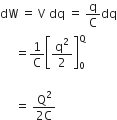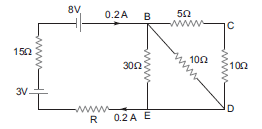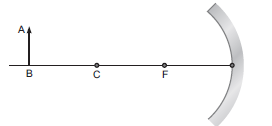 Short Answer Type
Short Answer TypeA circular coil of N turns and radius R carries a current I. It is unwound and rewound to make another coil of radius R/2, current I remaining the same. Calculate the ratio of the magnetic moments of the new coil and the original coil.
Deduce the expression for the electrostatic energy stored in a capacitor of capacitance ‘C’ and having charge ‘Q’.
How will the (i) energy stored and (ii) the electric field inside the capacitor be affected when it is completely filled with a dielectric material of dielectric constant ‘K’?When a capacitor is charged by a battery, work is done by the charging battery at the expense of its chemical energy. This work is stored in the capacitor in the form of electrostatic potential energy.
Consider a capacitor of capacitance C. Initial charge on capacitor is zero. Initial potential difference between capacitor plates =0. Let a charge Q be given to it in small steps. When charge is given to capacitor, the potential difference between its plates increases.
Potential difference between its plates, V= q/C
Work done to give an infinitesimal charge dq to the capacitor is given by, 
If V is the final potential difference between capacitor plates, then Q = CV
Work is stored in the form of electrostatic potential energy.
Electrostatic potential energy, U = 
When battery is disconnected,
i) Energy stored will decrease.
Energy becomes, U = 
So, energy is reduced to 1/K times its initial energy.
i) In the presence of dielectric, electric field becomes, E = 
Calculate the value of the resistance R in the circuit shown in the figure so that the current in the circuit is 0.2 A. What would be the potential difference between points B and E? 
A series LCR circuit is connected to an ac source. Using the phasor diagram, derive the expression for the impedance of the circuit. Plot a graph to show the variation of current with frequency of the source, explaining the nature of its variation.
Define relaxation time of the free electrons drifting in a conductor. How is it related to the drift velocity of free electrons? Use this relation to deduce the expression for the electrical resistivity of the material.
How does the angular separation between fringes in single-slit diffraction experiment change when the distance of separation between the slit and screen is doubled?
For the same value of angle incidence, the angles of refraction in three media A, B and C are 15°, 25° and 35° respectively. In which medium would the velocity of light be minimum?
A proton and an electron have same kinetic energy. Which one has greater de-Broglie wavelength and why?
An object AB is kept in front of a concave mirror as shown in the figure.
(i) Complete the ray diagram showing the image formation of the object.
(ii) How will the position and intensity of the image be affected if the lower half of the mirror’s reflecting surface is painted black?Draw a labelled ray diagram of a reflecting telescope. Mention its two advantages over the refracting telescope
